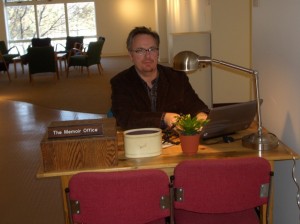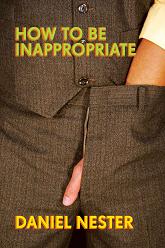by Allyson Latta
 DANIEL NESTER is the author of How to Be Inappropriate, a humorous creative nonfiction collection. Earlier collections, God Save My Queen and God Save My Queen II, explore his obsession with the rock band Queen. His writing appears in Salon.com, The Morning News, McSweeney’s, The Daily Beast, Time Out New York, and Bookslut, and is anthologized in The Best American Poetry 2003, The Best Creative Nonfiction, and Now Write! Nonfiction. He is associate professor of English at The College of Saint Rose in Albany, NY, and managing editor of the blog “We Who Are About to Die.”
DANIEL NESTER is the author of How to Be Inappropriate, a humorous creative nonfiction collection. Earlier collections, God Save My Queen and God Save My Queen II, explore his obsession with the rock band Queen. His writing appears in Salon.com, The Morning News, McSweeney’s, The Daily Beast, Time Out New York, and Bookslut, and is anthologized in The Best American Poetry 2003, The Best Creative Nonfiction, and Now Write! Nonfiction. He is associate professor of English at The College of Saint Rose in Albany, NY, and managing editor of the blog “We Who Are About to Die.”
WARNING: The following interview contains many instances of the F word. (No—the other one.)
AL: So, Daniel, in preparing for this interview, I had a chat with my husband about inappropriateness. Unfortunately he was the only expert at hand. (My teenage boys were out, no doubt doing something inappropriate.) You should know that I was, until about ten years ago, pretty much a prude. I grew up in a family where certain words were never uttered … like, well, I still have a hard time even writing it … fart. I’m not sure I knew what one was until after I left home.
DN: I know this isn’t a question, or maybe it is, but I have to comment. Growing up, I was not allowed to say “fart.” My sister and I said “beep”; as in, “ever since Aunt Kitty got her gall bladder taken out, she beeps like crazy at family parties.” We would call our genitals “dee-dees.” I have always thought that by not being allowed to say “fart” or “balls” or “weiner,” it led to a fascination with these words and acts in my adult life.
AL: <Laughing> Well, I asked my husband for suggestions, and he said, “Watch five episodes of Family Guy.” I never watch that show and he knows it. I once stumbled on a commercial for it and still feel traumatized. Therefore I come to you possibly unprepared for this interview.
Do you even watch Family Guy?
DN: I do not.
AL: So much for my resident expert.
DN: My family does, a couple of friends, and definitely my nephews. I have seen the main guy, Seth MacFarlane, on Bill Maher a couple of times, and he was very funny. I don’t really watch animated comedies as a regular thing.
AL: What TV shows, then, make you laugh out loud? What books or authors?
DN: I love The Daily Show, Colbert Report, 30 Rock, The Office, Modern Family, I guess the usual sitcoms. I keep watching Saturday Night Live in the hopes I’ll find a sketch or two that’s funny. Lately, I have discovered Garry Shandling’s old shows on Netflix, as well as Mr. Show and Arrested Development.
Authors-wise, everybody from H.L. Mencken to Rachel Shukert breaks me up. Lately I’ve been reading Mark Leyner, who was writing hilarious fiction and journalism at a great clip almost 20 years ago, and who is now largely out of the game. There are the current masters—David Sedaris, Jonathan Ames, Sarah Vowell, Meghan Daum, Cintra Wilson.
AL: Have reviewers compared you to other authors? And if so, do you agree with these comparisons?
DN: There have been mentions of Tucker Max or whatever. Mostly I disagree with that and the other comparisons. Which is more my problem than theirs. I mean, if the writers I would like to be compared to aren’t manifested in my writing, then that must mean I’m doing something wrong. Right?
AL: So who would you like to be compared to?
DN: Joan Didion, Susan Sontag, and Janet Malcolm come to mind as writers of clean, lean prose that I would love mine to be like. I look at their sentences and paragraphs and just try to copy it, with greater and lesser degrees of success.
 AL: I discovered your website and your writing after reading about The Memoir Office. Can you tell us about how this performance-art/writing installation came about?
AL: I discovered your website and your writing after reading about The Memoir Office. Can you tell us about how this performance-art/writing installation came about?
DN: Well, the idea came out of my love for how many conceptual and performance artists involve their audience and their spaces in the creation of their arts or their pieces. Why can’t I do that with my own writing? The most obvious or most recent inspiration is Marina Abramovic, who has this great show at MoMA last spring called The Artist Is Present. Her idea was to sit in the middle of MoMA across from people who wanted to visit her. It sounds freaky, but it was really quite touching. There’s another artist, Nate Hill, who has a Punch Me Panda and other interactive projects where the audience is needed to make it work. That’s the idea behind The Memoir Office in theory, and it’s still evolving in practice.
AL: I loved your videos of The Memoir Office (here and also here). Were there any surprises that came out of that experience?
DN: There were a lot of them. First off, people seemed very accepting that I was, in fact, a performance artist; I was waiting for people to tap me on my shoulder and tell me that I wasn’t qualified or something. But what I found is if I kept a straight face, everything would be okay. Also: people want to believe in these sort of projects. They give you the benefit of the doubt. I found the experience with visitors—where we talked about writing in general, memoirs, whatever I was working on or whatever they were working on—to be much more serious than I envisioned. People really want to make connections. They want to tell their stories.
AL: What was the most inappropriate thing someone asked you as The Memoirist?
DN: People were often very nice, maybe even too nice, when they interacted with me. There was one lady who crop-dusted a very stinky-ass fart in the lobby where my Office was located.
AL: I guess I walked right into that one … Which brings us to How to Be Inappropriate. What is it about inappropriateness that draws you? Is it about pushing boundaries? Getting reactions?
DN: I like to write about the very thing people don’t want to talk about. Farts. Mooning. Old girlfriends who let their feet get licked. New York Poets who lack all conviction and social skills, myself included. Teenage non-native speakers of English who try out new curse words. I don’t think I’m pushing boundaries so much as writing about what I want to really write and really enjoy writing about. I have written in the past to get reactions—be it blog posts, manifestos, or poems that I thought would please a certain kind of reader—but that doesn’t work for me, at least most of the time.
AL: What’s the most memorable reaction a reader has had to that collection?
DN: I think Elizabeth Hildreth, who is an old friend and who interviewed me over at Bookslut, had some super reactions to some of the more serious pieces in the book—like the long chapter on my wife and me undergoing in vitro fertilization for years before the birth of our first daughter—and how that connected with some of the more broad humour in the book. She really got it. Or she was trying to be nice. But I think she got it.
DN: Oh isn’t that a delight? That’s all about the book designer, Alvaro Villanueva. We also did whoopee cushions and other merch, too, with another couple of graphic designers, Mark Hamilton and Chris Parody.
AL: Do you find most of the humour in the collection appeals more to men than women, or to a certain demographic? Mooning, flatulence, penile enhancement. Not, as Seinfeld would say, that there’s anything wrong with that.
DN: I don’t know. I didn’t set out to write a guy’s book, but I can see how dudes might relate to that stuff more than your average female. But the in vitro fertilization chapter in the book is all about sisterhood and the magic that is mothers.
AL: That’s a very personal and moving story, and one of my favourites in the collection. How did your wife feel about your writing on that experience?
DN: One thing I think readers assume is that my wife didn’t want me to write about our journey with in vitro fertilization, but she’s been completely supportive in that regard. She wants people to know about it, and take the stigma away from addressing it. This all makes her even more awesome in my eyes.
AL: What, then, would she say is the most inappropriate thing you ever wrote about?
DN: I guess she would prefer I not write about sexual things so much. I do know that she didn’t want me taking ExtenZe pills myself and writing about my penis. So I concocted a plan to have ten of my friends take the pills, which led to an article for The Daily Beast as well as a full-blown scientific article based on the Watchful Analysis for New Growth (WANG).
AL: In HTBI you mention your family, aside from your wife, only peripherally. Is it to protect them … or to protect yourself from them?
DN: Well, I do have a lot of family-memoir-type stuff that I’ve been working on for years, and the memoir-type stuff that’s in the book took place before I met my wife. So it’s not really to protect anyone, at least consciously. The next couple years will have some family things, once I get a good foothold and finish it. That being said, I haven’t written much about my being a father to our two girls. A lot of people have written about fatherhood and done it well, and I’m not sure how I should do it. I’d rather not write reverentially about my gorgeous girls or whatever. We’ll see.
AL: Tell me about a time when you behaved appropriately—but later wished you hadn’t.
DN:
- The three years kneeling at the foot of priests as an altar boy at Our Lady of Perpetual Help, Maple Shade, NJ.
- Appointment with a proctologist in 2004, Upper West Side, NY.
- Partying with strange drunk German people at the fall of the Berlin Wall, New Year’s Eve, 1989.
AL: I’d ask you to elaborate but I’m afraid to …
And read Part 2 of my interview with Daniel.
“There are plenty of fart jokes in Shakespeare, and plenty of pathos in Captain Underpants.”
–Charles London, “Boys Don’t Read, Except When They Do”
HuffPost Education (May 14, 2011)
